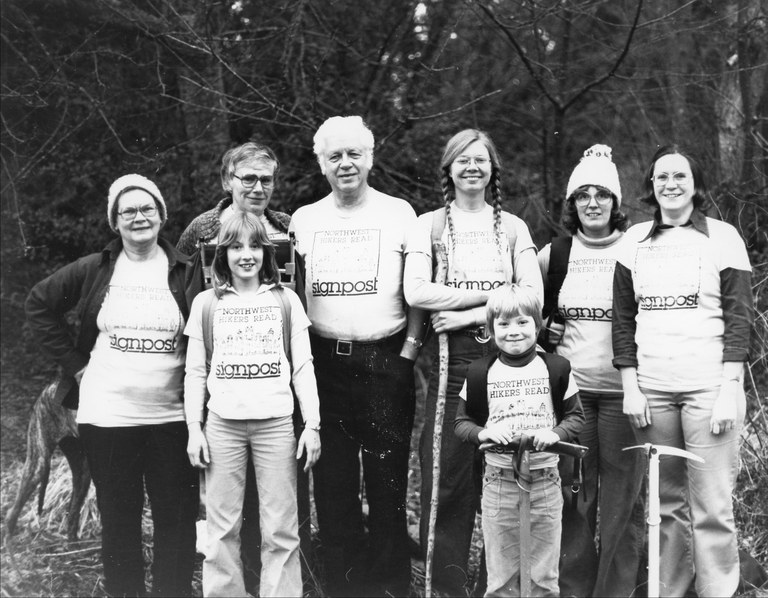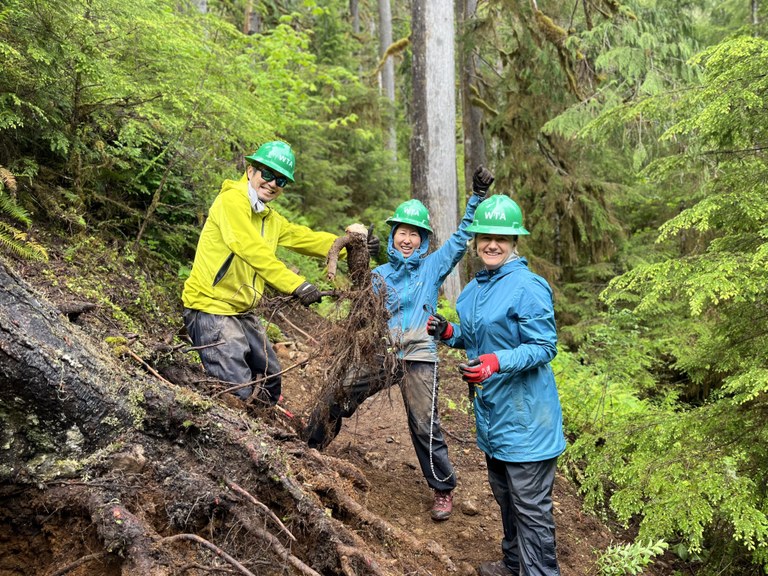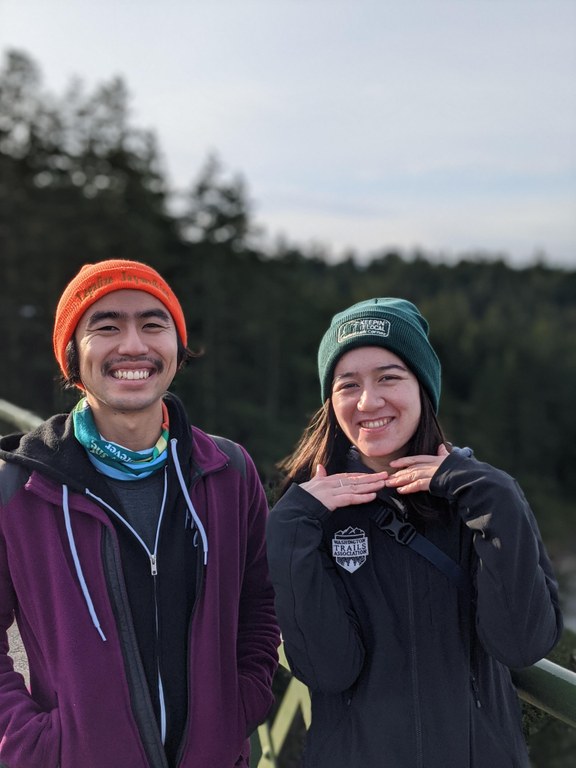 Washington Trails
Association
Washington Trails
Association
Trails for everyone, forever
Dig into WTA's history of protecting trails.
We’ve been devoted to a better future for trails since WTA's founding. And that means looking for creative, innovative solutions to problems — and stepping up to fill the gaps. Here are eight ways our innovations have been leading the way for trails and hikers in Washington — and even across the country.

Louise Marshall (left) started Signpost in 1966 and it soon evolved into a platform for community building and activism.
WTA began in 1966 when Louise Marshall created Signpost, a grassroots newsletter that brought hikers together to share their knowledge and love of trails. In a way, Signpost was a very early form of hiking social media. With the newsletter, Louise created a more connected outdoor community — a theme that has continued through our work. She was also a woman leading in a predominantly male industry — and that tradition of strong leadership by women has continued throughout WTA’s history.
Since our early years, it has been clear that many decisions impacting trails happen on a different kind of hill. WTA has a history of making the voices of hikers heard in Olympia and the U.S. Congress. Several years ago, we partnered with Washington Bikes to get the Legislature to approve state funding for a study, the first of its kind in Washington, about the health and economic benefits of trails. That information has been used by agencies and outdoor-recreation organizations to make a case for trails ever since. And, just this year, we successfully led an effort to get game-changing funding, securing $15 million in annual funding for state land agencies. It’s the first time in recent memory that an advocacy organization has been able to get more funding for the maintenance backlog on state lands.

Greg Ball, WTA’s former executive director, saw a problem in the early 1990s. Trails weren’t getting the maintenance they needed and he wondered, “What if we helped out?” Land managers were dubious at the beginning, but we’re now a trusted, essential partner. And we are the largest state-based volunteer trail maintenance program in the nation. WTA volunteers now give more than 150,000 hours to trails each year. And we make the absolute most of that time. We run a major logistical operation, using all of the tools we have to get the right people to the right trails at the right time. From vanishing backcountry trails to brand new urban green spaces, we’re making sure the hikes people want are safe and accessible.

Two years ago, WTA launched our Emerging Leaders Program (ELP). ELP aims to offer more entry points to the outdoor industry for communities that haven’t always had equitable access to the outdoors. We believe that trails are for everyone. We’re working to make that a reality by helping build representation in the professional outdoor industry. The positions are paid and cohort members gain experience in trail work and earn wilderness first aid certifications. They also get mentorship and chances to work on projects of interest with WTA staff. Five of the 11 ELP cohort members are currently working for WTA, three are working for partner organizations, one is thru-hiking the PCT and two are in educational programs. We’re excited that the program will be able to expand in the coming years thanks to a new partnership with Washington State Parks.

Every year, we help more than 5 million people plan their outdoor adventures. Our website’s expert, curated information, combined with up-to-the-date trail conditions from trip reports, gives hikers of all skill levels the information they need to get out safely. And we keep adding new tools — like our wheelchair-friendly hiking filter and Hike Recommender. We can even help folks while they’re on the go with our free Trailblazer app, available on iOS and Android. The app is getting an update this year — download it to check out the recent improvements.
One of WTA’s strengths is our ability to bring people together, which we’ve been doing since the 1960s. We’ve helped various groups — conservationists, mountain bikers, equestrians, motorized vehicle users — see that we have more in common than in conflict and that we are more powerful when we work together. Over the years, we have helped protect countless wild places, including the Alpine Lakes Wilderness, where we continue to work today. And when COVID required quick and creative action, we took our coalition skills and inspired a national movement. The Recreate Responsibly Coalition led the way on a set of clear, consistent standards to help keep people safe while enjoying much-needed time outdoors.

Whether through trail work parties for youth, lending gear or training mentors, WTA helps young people get outdoors. Photo by Britt Lê.
WTA believes in the power and potential of the next generation to steward trails. We know there are many paths to the outdoors and we are investing in our youth program to clear the way — connecting youth to mentors, offering training and helping them discover what is possible. For many, our programs have been a launching pad for outdoor careers. Austin Easter, who manages our Lost Trails Found crews was a WTA volunteer in high school — and several of the crew members began volunteering with WTA in high school as well. We also want to ensure that youth and families that haven’t traditionally had access to trails can discover the joy and benefits of time outside. We learned we can do the most good by training folks who work with youth on how to get outdoors. From the first stages of training all the way through their trips, we support leaders. By empowering as many people as possible to lead outdoor trips, we have an exponential reach.

We know how important it is to look for big-picture solutions. For hikers and trails, that means thinking at the landscape level and working through the whole process. From the first idea to a ribbon cutting on a trail, we’re doing the work, including facilitating community input and designing and building trail systems. In the Teanaway Community Forest in Central Washington, we’re leading a trail-planning effort that will formally designate trails in Washington’s first state-owned community forest. And we’re working in Silver Star in Southwest Washington to find solutions in an area that’s full of potential for hiking but faces challenges from bad roads and trails that need to accommodate a variety of users. We’re bringing the community together to create a stronger trail system for a beautiful area. Work like this creates benefits for decades to come.
WTA has a history of seeing a problem and finding a solution.
We support communities, inspire action and build creative new programs. We know anything is possible when hikers come together. Whatever comes next, WTA will be on the frontline to ensure trails for everyone, forever. Thank you for joining us in this work!